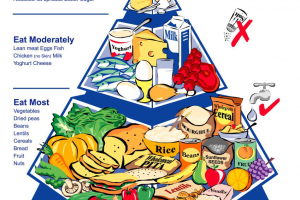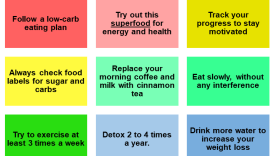The Ultimate Guide to a Healthier Lifestyle Through Nutrition

Introduction to Nutrition and Healthier Living
Understanding the Importance of Nutrition
Nutrition forms the bedrock of our health, influencing everything from energy levels to mood. Imagine waking up feeling refreshed and energetic versus sluggish and irritable—often, the difference lies in what fuel we provide our bodies. A well-balanced diet not only aids in physical health but also plays a pivotal role in mental clarity and emotional stability. Consider this:
- The Ultimate Guide to a Healthier Lifestyle Through Nutrition
- Introduction to Nutrition and Healthier Living
- Understanding the Importance of Nutrition
- Key Components of a Healthy Lifestyle
- Building a Balanced Diet
- Incorporating Nutrient-Dense Foods
- Portion Control and Moderation
- Benefits of Healthy Eating
- Improved Physical Health
- Enhanced Mental Well-being
- Mindful Eating Habits
- Listening to Your Body's Hunger Cues
- Practicing Mindful Eating Techniques
- Meal Planning and Prep
- Tips for Effective Meal Planning
- Benefits of Meal Prepping
- Healthy Alternatives and Substitutions
- Swapping Out Processed Foods
- Finding Healthier Ingredient Options
- Hydration and Its Impact on Health
- Understanding the Importance of Hydration
- Tips for Staying Hydrated Throughout the Day
- Functional Foods and Superfoods
- Exploring Functional Foods for Health Benefits
- Incorporating Superfoods into Your Diet
- Quality Over Quantity: Eating smaller amounts of nutrient-dense foods can lead to better health outcomes compared to larger quantities of empty-calorie meals.
- Diverse Diet: Incorporating a wide variety of foods ensures that your body receives all the necessary vitamins and minerals.
Key Components of a Healthy Lifestyle
A healthy lifestyle comprises several interconnected components that go hand in hand with proper nutrition:
- Regular Physical Activity: This boosts cardiovascular health and improves mood.
- Adequate Sleep: Insufficient sleep can lead to poor food choices and reduced energy.
- Stress Management: Chronic stress can derail even the best dietary intentions.
By making mindful choices across these areas, individuals can cultivate a lifestyle that promotes lasting wellness. Embracing these principles makes each day a step toward a healthier future.
Building a Balanced Diet
Incorporating Nutrient-Dense Foods
Transitioning from a basic understanding of nutrition to building a balanced diet starts with one important step: incorporating nutrient-dense foods. These are foods that provide a high amount of nutrients relative to their calorie content. Think of them as the gold stars in your pantry! Some excellent options include:
- Fruits and Vegetables: Bright colors often mean rich vitamins. Try adding a rainbow of produce to each meal!
- Whole Grains: Foods like quinoa, brown rice, and whole wheat bread are excellent sources of fiber and energy.
- Lean Proteins: Incorporate chicken, fish, beans, and lentils for muscle maintenance and repair.
- Healthy Fats: Avocado, nuts, and olive oil support heart health.
Portion Control and Moderation
Even the healthiest foods can lead to unwanted weight gain if eaten in excessive amounts. This is where portion control and moderation come into play. Here are a few tips:
- Use Smaller Plates: This simple trick can help trick your mind into feeling satisfied with smaller portions.
- Serve Balanced Plates: Aim for half your plate to be fruits and vegetables, a quarter for proteins, and a quarter for whole grains.
- Mindful Eating: Pay attention to hunger cues—stop eating when you feel satisfied, not stuffed.
Balancing nutrient-dense foods with proper portion sizes ensures a diet that not only nourishes but also supports overall health.
Benefits of Healthy Eating
Improved Physical Health
Building on the importance of a balanced diet, the benefits of healthy eating are profound, particularly in terms of physical health. Eating nutrient-dense foods not only helps maintain an ideal weight but also reduces the risk of chronic diseases. Here are some remarkable benefits:
- Heart Health: A diet rich in fruits, vegetables, and whole grains can lower blood pressure and cholesterol, promoting better cardiovascular health.
- Stronger Immune System: Foods high in antioxidants, like berries and leafy greens, can bolster your immune defenses.
- Better Digestion: Fiber-rich foods improve gut health and contribute to regular digestion.
Enhanced Mental Well-being
Healthy eating goes beyond just the physical; it has a tremendous impact on mental well-being. Many people report feeling more energetic and focused after making dietary changes. Consider these advantages:
- Mood Regulation: Nutrient-rich foods can help stabilize mood swings and ensure emotional stability.
- Cognitive Function: Omega-3 fatty acids found in fish can enhance memory and cognitive abilities.
- Stress Reduction: Eating well can lower stress levels and improve resilience to challenges.
By embracing healthy eating, individuals can enjoy a holistic improvement in both physical and mental health, paving the way for a happier, healthier life.
Mindful Eating Habits
Listening to Your Body’s Hunger Cues
As individuals embark on a journey towards healthier eating, developing mindful eating habits becomes essential. A crucial aspect of this is learning to listen to your body’s hunger cues. Many people mistakenly eat out of habit or emotional triggers rather than actual hunger. Here are some tips for tuning into your hunger signals:
- Ask Yourself Questions: Before reaching for a snack, ask, “Am I truly hungry?” A scale from 1 to 10 can help gauge your hunger—a 3 signals a light snack might be needed, while a 7 or 8 means it’s time for a meal.
- Delay Gratification: When craving a specific food, wait 15 minutes. This pause can help distinguish between physical hunger and emotional cravings.
Practicing Mindful Eating Techniques
Once you recognize your hunger cues, practicing mindful eating techniques can enhance the experience. This approach transforms your meal times into moments of awareness and appreciation. Consider these techniques:
- Eat Slowly: Take the time to savor each bite, noticing the flavors and textures. This practice often leads to better digestion and more satisfaction.
- Eliminate Distractions: Turn off screens and focus on your meal. Engaging fully can help you recognize when you’re full, preventing overeating.
By integrating these habits into daily routines, individuals can foster a healthier relationship with food, allowing for an enriched dining experience.
Meal Planning and Prep
Tips for Effective Meal Planning
Having embraced mindful eating habits, the next step to reinforcing healthier living is to dive into meal planning and preparation. This proactive approach can save time, stress, and unhealthy food choices on busy days. Here are some effective tips for meal planning:
- Start Simple: Choose a few recipes for the week that utilize overlapping ingredients to minimize waste and maximize flavor.
- Schedule Your Planning: Set aside a specific day each week to plan your meals. Treat it like an essential appointment on your calendar.
- Create a Shopping List: Once you’ve decided on meals, jot down all the ingredients you need. Sticking to the list helps you avoid impulse purchases.
Benefits of Meal Prepping
Now, let’s touch on the remarkable benefits that come with meal prepping.
- Saves Time: Preparing meals in advance means you won’t be scrambling for dinner at the last minute.
- Portion Control: Prepping meals allows for better portioning, reducing the chances of overeating.
- Healthier Choices: With ready-to-eat meals on hand, you’re less likely to succumb to takeout or fast food temptations.
By implementing these tips and recognizing the benefits, individuals can enjoy a more organized and health-conscious approach to their eating habits.
Healthy Alternatives and Substitutions
Swapping Out Processed Foods
With well-structured meal planning and preparation in place, it’s time to focus on making smarter food choices. One critical aspect is swapping out processed foods, which often contain unhealthy additives, high sodium levels, and sugar. Making conscious substitutions can not only enhance flavor but also boost nutrient intake. Here are some easy swaps:
- Instead of White Rice: Try quinoa or brown rice for added fiber and nutrients.
- Replace Soda: Opt for sparkling water with a splash of lemon or lime; it’s refreshing without the sugar crash.
- Choose Whole Grain Bread: This option is far superior to white bread due to its higher fiber content.
Finding Healthier Ingredient Options
Finding healthier ingredient options opens up a world of delicious possibilities while maintaining nutrition.
- Use Greek Yogurt Instead of Sour Cream: This substitution provides additional protein and a tangy flavor.
- Substitute Applesauce for Oil in Baking: It keeps your baked goods moist while cutting down on calories and fat.
- Fresh Herbs Over Processed Sauces: Herbs like basil, cilantro, or parsley can elevate dishes with vibrant flavor without added preservatives.
These small yet impactful changes can significantly contribute to healthier eating habits, allowing individuals to enjoy their food without compromising their health.
Hydration and Its Impact on Health
Understanding the Importance of Hydration
Now that we’ve explored healthy alternatives and substitutions, let’s shift our focus to hydration—a crucial yet often overlooked aspect of overall health. Proper hydration supports virtually every bodily function; from regulating temperature to ensuring efficient digestion and nutrient absorption. Consider this: even mild dehydration can lead to fatigue, headaches, and reduced concentration. Imagine those dreary days when you’re feeling sluggish and unfocused; often, reaching for a glass of water can be the quickest pick-me-up! Here are some key benefits of staying hydrated:
- Enhanced Physical Performance: Adequate fluid levels can improve endurance and strength during workouts.
- Better Skin Health: Hydration contributes to the elasticity and glow of your skin.
- Support for Weight Management: Drinking water before meals may help control appetite.
Tips for Staying Hydrated Throughout the Day
Maintaining hydration can be simple with a few strategies in place:
- Carry a Reusable Water Bottle: Keep it filled and within reach to encourage frequent sipping.
- Set Reminders: Use phone alarms or apps to remind you to drink water regularly.
- Infuse Your Water: Add slices of fruit like lemon or cucumber for flavor, making hydration enjoyable.
By understanding the importance of hydration and implementing these tips, you can support your body while feeling refreshed and energized throughout the day.
Functional Foods and Superfoods
Exploring Functional Foods for Health Benefits
Having discussed the significance of hydration, it’s now time to delve into the world of functional foods and superfoods. Functional foods are those that provide health benefits beyond basic nutrition. These foods can support various bodily functions, helping to prevent diseases and promote overall well-being. For example:
- Greek Yogurt: Packed with probiotics, it supports gut health and boosts the immune system.
- Oats: Rich in beta-glucans, oats can lower cholesterol levels and support heart health.
- Garlic: This powerful ingredient has been linked to digestive health and improved cardiovascular function.
Incorporating Superfoods into Your Diet
Superfoods are a subset of functional foods known for their exceptional nutrient density. Incorporating these into your meals can elevate your nutrition significantly. Here are a few irresistible options:
- Chia Seeds: These tiny seeds are high in omega-3 fatty acids, fiber, and antioxidants; add them to smoothies or oatmeal for an easy boost.
- Kale: Rich in vitamins K, A, and C, this leafy green can be tossed into salads or blended into smoothies.
- Blueberries: Loaded with antioxidants, they make for a delicious snack or a sweet addition to breakfast.
Embracing functional foods and superfoods into your diet can foster a healthier lifestyle, promoting vitality and overall well-being.





